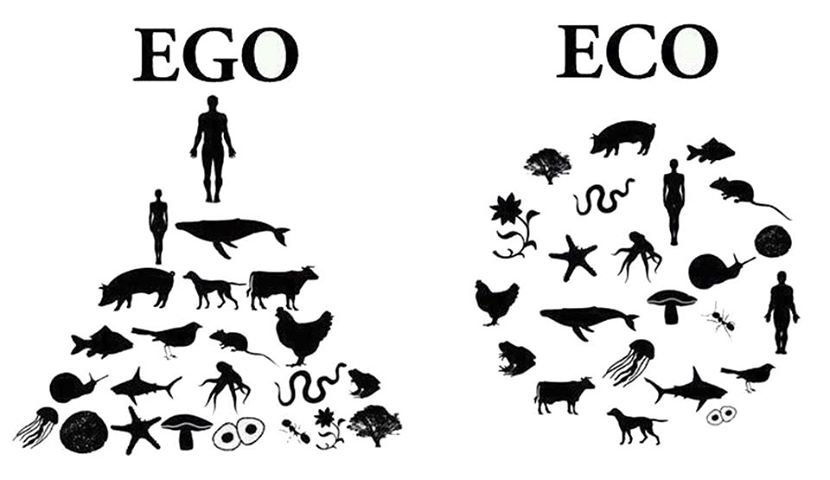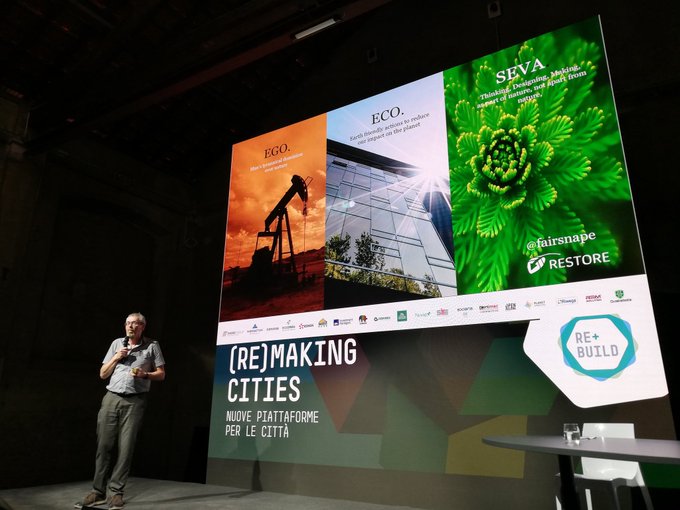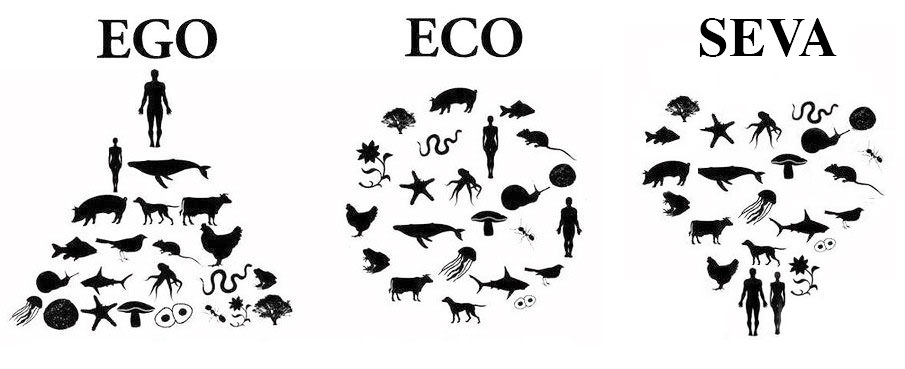Reading Zoe Cohen’s recent linkedin share of a 2016 Ego-Eco article from Art Tawanghar lead me to revisit my my framing of regenerative sustainability work and consultancy support within Ego-Eco-Seva thinking …
Ego-Eco is a great way to frame our past and current approach to the environment, sustainability and the climate crisis, but does it go far or deep enough? We tend to think of ‘Ego and Eco’ as being distinct periods, Ego illustrating our thinking post-industrial revolution when we took what we wanted to satisfy egos, and dumped what we didn’t without thought to the consequences.
We perhaps see the current ‘Eco’ period starting in the 1970s with the first Earth Day, or with the Club of Rome, or as I like to frame it, with the 1987 Brundtland Common Purpose definition. But of course, ‘Ego and Eco’ are running concurrently. Even in the era of ‘Eco’ focus we see Ego’s surface and suppress Eco thinking, for example, in the auctioning of the Arctic wildlife area for oil drilling, in the UK HS2 project and architects pulling out of Architects Declare to continue working on projects that are seen by many as vanity projects.
But the Eco phase, if taken as the Brundtland ‘do nothing today to compromise tomorrows generation’ is failing us. Over the last 30 or so years since Brundtland most if not all climate indicators, (CO2, temperatures, waste et al) continue heading in the wrong direction.
Yet, against this backdrop, connectivity with nature has become a keystone for the emerging regenerative sustainability agenda. Manifest through the ‘woke’ application of biomimicry, biophilia and sustainable building accreditations such as the Living Building Challenge that see buildings and us as inhabitants as part of the natural eco-systems. But these are the exemptions and in many ways still passive, with a dominant focus on reducing impact.
We need something more, a new mindset to eclipse ‘Eco’. Many like myself (Daniel Wahl, Cost Restore and others) are using the Sanskrit expression of Seva. It translates as ‘being in service’ which I have used as ‘doing the right thing’ because we are a part of, not apart from nature, it is very much reciprocity, we are in service to nature as nature is in services to us.
The earliest illustration of ‘Ego Eco Seva’ was in a GlanceSideways blog, Oct 2012 adjusting the Ego Eco graphic to show ‘the path to a perfect relationship within the ecosystem” As a graphic, it triggers a powerful and necessary reframing of Ego-Eco as the attitude needed to create a sustainable culture, ‘one that nourishes and cares for the earth we live on. Seva is a role that can only be performed with a relationship of love and humility to all entities in the environment’
Ed Gillispie in a lovely early 2020 Medium The End of ‘Saving the World’? article describes the Seva mindset … ‘The planet does not want to be saved. Or rescued. Or even changed. Our planet wants to be loved. Love is not a game of numbers and spreadsheets, checks and balances, debts and contracts. It is an exalted dance of joy, respect and gleeful, mutual appreciation and true partnership’.
In the wonderful Braiding Sweetgrass, Robin Kimmerer Wall addresses Seva and reciprocity from an indigenous angle, learning from plants, learning from nature. For example through the harmonious harvest of only taking what we need and using everything we take. RKW writing recently in Emergence Magazine, The Serviceberry takes this further as a basis for a new bio-economy … an economy of abundance
Arundhati Roy writing in the Financial Times at the start of the lockdown in the UK describes the pandemic as a portal through which we will pass. (This was one of the articles that triggered my founding the successful Zoom Regenerative series) And now with vaccines, we can start to see the other side of the portal, and focus on her question of what good will we take through, and what bad will we leave behind.
A sustainability Seva approach based on reciprocity, in service to others and nature, would be a fine thing to take through the pandemic portal as the new normal for 2021 and beyond. We have technological and digital solutions, we have nature-based solutions, we now need the new normal, free from the restraints of the ego-eco old normal, to apply and scale-up.
…
Read Zoe Cohen’s Linkedin Post sharing a 2016 article from Art Tawanghar that lead me to revisit my my framing of regenerative sustainability work within Ego-Eco-Seva thinking …



